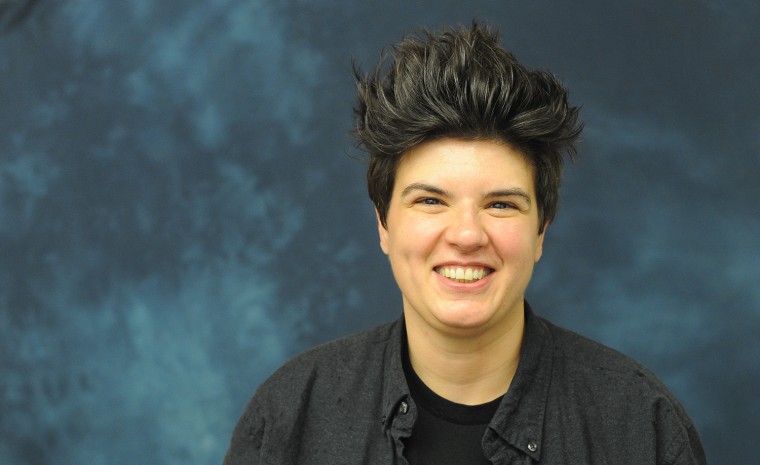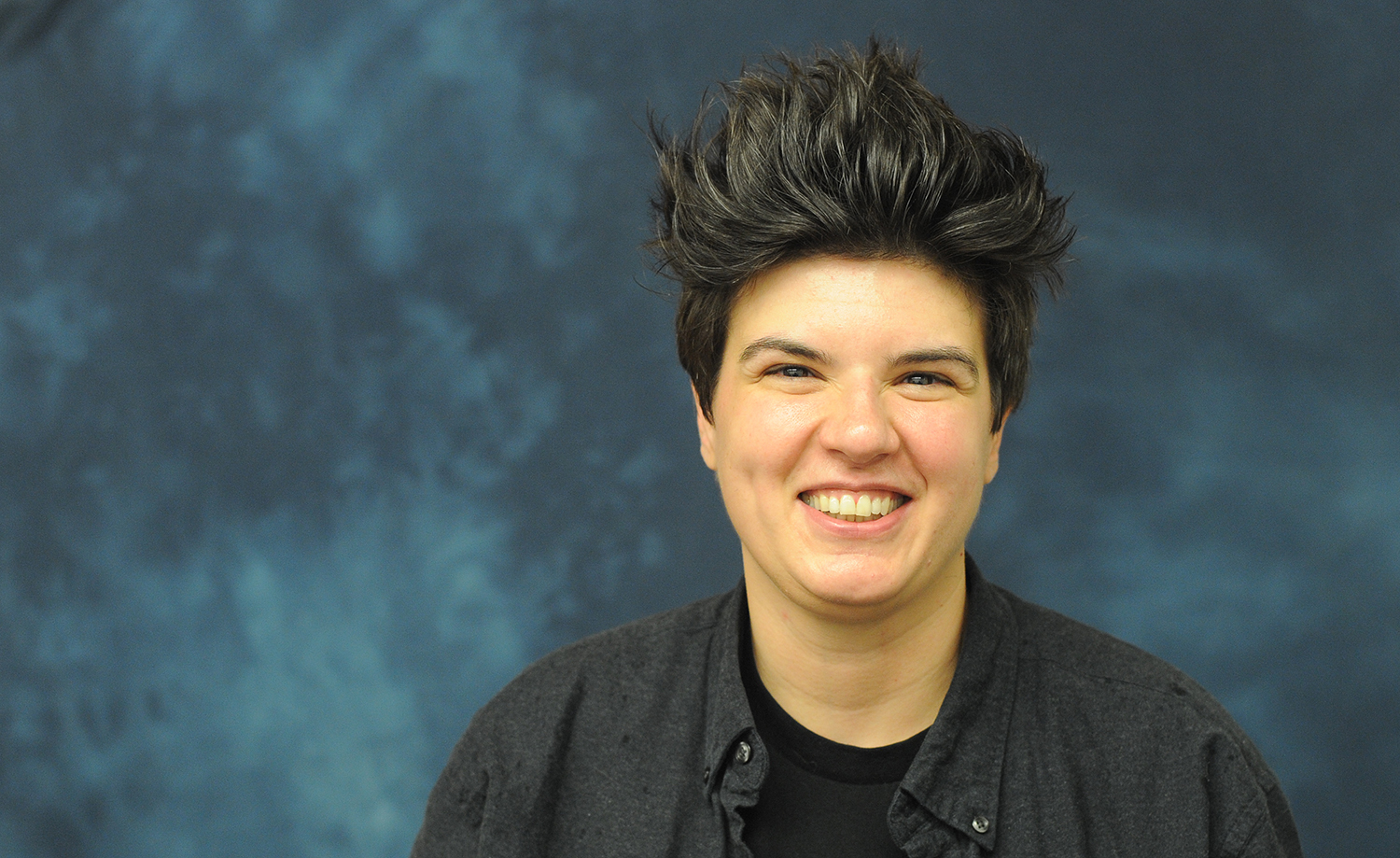Assistant Professor of American Studies Grappo ’01 Teaches Latino Studies, Queer Studies


Q: Welcome back to Wesleyan, Professor Grappo! Can you please fill us in on what you’ve done since graduating from Wes?
A: After graduating from Wesleyan in 2001, I worked a fifth grade teacher at a Catholic school in the Bronx. Then I went to grad school at Yale and got my Ph.D. in American Studies. I took a job for a couple years as an assistant professor of American studies at Dickinson College, a small liberal arts school in Pennsylvania. Last year, I came to Wesleyan as a visiting professor, and this year I began as a full-time, tenure-track professor.
Q: How does it feel to be back at Wesleyan?
A: I’m excited to be back. I had a wonderful experience here as an undergrad. It was really formative for me as a scholar and I made good friends and enjoyed many of the resources Wesleyan offers. When I saw there was a position open here, it seemed like a terrific opportunity, as not only is Wesleyan an incredible institution, but it’s also in a great area of the country, with so many excellent resources—other universities, libraries, museums, cities—located nearby. I really like the Wesleyan community, and all the smart and interesting people who are here.
Q: Please describe your research interests.
A: The two main fields I work in are Latino studies and queer studies. I feel like my work is guided by ethical and theoretical parameters, and I try to think through conceptual ideas within specific cultural and political moments and texts.
I’m currently working on a book manuscript called “Home and Other Myths: A Lexicon of Queer Inhabitation,” which is about the concept of “home” in the context of minoritarian politics and culture. The decision to use the concept of home as a structural theme was partly inspired by the work of Jean Amery, who is well know for his writings on surviving the Holocaust. In his book At the Mind’s Limits: Contemplations by a Survivor on Auschwitz and its Realities, he defines home not as a place, but as a state of innocence— a way of being in the world where you trust in the laws and customs of the land in which you live, a state in which you trust in the basic moral goodness of other people. Amery writes eloquently and convincingly about how the Holocaust shattered that state for Jews. Extrapolating from this idea, I argue that this conception of home offers a rich and productive way of thinking about contemporary queer life in the U.S., as queer people are often cast outside of the figurative boundaries of national and cultural homelands.
Q: What courses did you teach this semester, and what do you plan to teach in the future?
A: This semester, I taught an introductory Latino studies class and an upper-level class called Diaspora Border Migration. The Introduction of Latino Studies course introduced students—mostly first-years and sophomores, interested in a variety of different fields—to the history, politics, and culture of Latinos in the U.S. Although the class focuses on Latino identities, we considered the ways in which studying latinidad resonates with the larger field of American studies as well. With all my classes, I hope to encourage students’ curiosity and encourage them to think more carefully and deeply about the issues at hand. And with introductory courses in particular, I also hope that the concepts we discuss will pique their interest and guide them toward taking more American studies courses and considering the major. This semester, my upper-level seminar had a number of American studies majors, but also included students majoring in government, history, theater, and Latin American studies. In addition to a more theoretical dense syllabus, the course also asked students to reflect on important current events, such as the President’s speech on immigration, the various debates and actions concerning “securing the border,” and the concept of “illegality.”
Next semester I am teaching a junior colloquium called Cultural Theory and Analysis, which explores influential political theories and cultural concepts in the Western canon. I‘ll also be teaching a seminar titled Queer of Color Critique, which focuses on the ways in which people of color have critiqued queer political and scholarly work through the lens of racial and ethnic differentiation. Next year I’ll be teaching two introductory courses, one on Latino studies and one on queer studies, and two upper-level seminars in the same fields.
Q: I understand the Queer Studies cluster was established at Wesleyan after you were hired. Can you please tell us a little about the cluster, and how it will change the academic experience for students interested in this field?
A: The Queer Studies cluster has been in the works for a long time, but was formally established this year under the leadership of my American studies colleague Margot Weiss, [associate professor of American studies, associate professor of anthropology]. There are a number of professors who contribute classes to the cluster, including some recently arrived scholars. I believe the cluster will give students who are interested in queer studies an accessible academic path to follow, as they’ll be able to easily look online and see all the classes available, allowing them to cumulatively build a course of study that is nuanced, diverse, and thorough.
I’ve observed a lot of interest from students in exploring the field of queer studies—both in a scholarly way and a political way. I think that queer studies as a field has become central to understanding American studies. It’s important to note that queer studies is an expansive discipline – that is to say, it’s not just talking about gay people (not that there’s anything wrong with that!). Rather, queer studies as a discipline asks us to think about the world from a minority point of view. What does it mean to negotiate difference? How do we think about minorities in a majority culture, and how are their rights and care determined?
Q: As a student at Wesleyan, you majored in “Women’s Studies.” Can you talk about how the field has changed since that time? The major is now “Feminist, Gender and Sexuality Studies.”
A: I think it’s gone from being primarily an analysis of gender—which is, of course, important—to a broader way of thinking about how gender and sexuality, which are closely and inextricably tied together, work to construct experiential and political life. People often think of “women’s studies” or “feminist, gender and sexuality studies” as niche fields. But women are half the world. And thinking about gender and sexuality is not just important for people who identify as women, it’s for everyone: how we identify as humans–it’s one of the most basic ways in which we negotiate difference, and it has far reaching implications for everything from the creation of human life to the workings of global politics.
Q: What’s your favorite part about teaching here so far?
A: The students at Wesleyan are outstanding: They’re smart, creative, dedicated to learning, and very interested in the world around them, both culturally and politically. I find the vast majority of my students to be really interesting, intelligent people. I love our class discussions, and hearing what students think about ideas and texts. It can be fascinating for me to interact with students as they lay fresh eyes on material I know well, and very rewarding when a student comes up with an angle I hadn’t considered.
Q: What do you like to do outside of work?
A: I have two-year-old twins, who take up a lot of my time. We have two dogs and a cat, all rescue animals, who are also integral parts of our family. And, as we live in the forest, we spend a lot of time outside, hiking, spending time with family and friends, and working hard in our vegetable garden.

